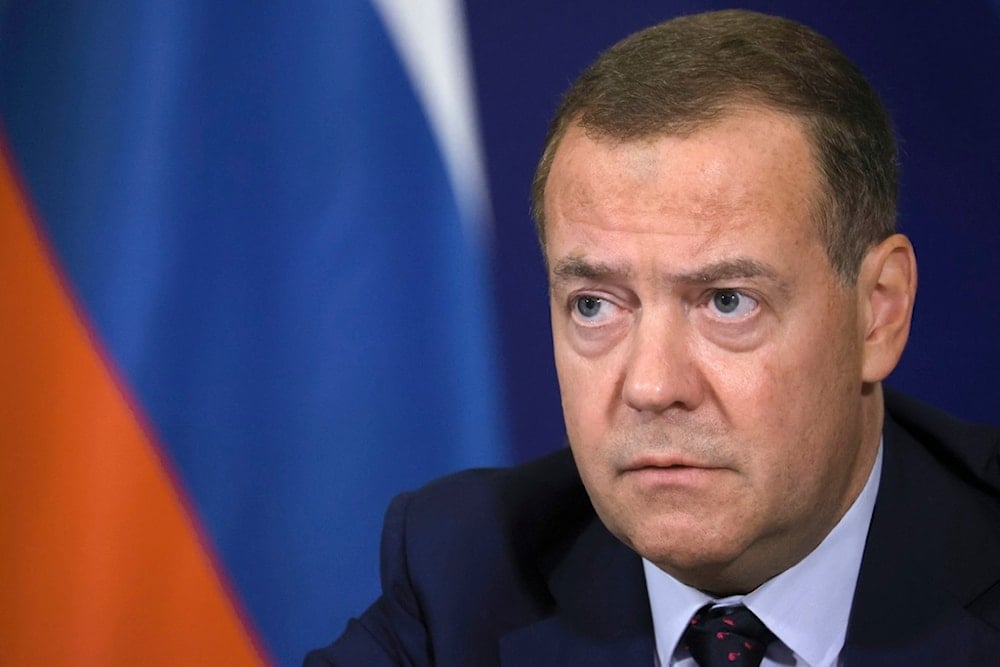Kiev's Kursk offensive prerequisite for nuclear strike: Medvedev
According to another Russian official, Moscow is aware that the West has decided to target deep into Russian territory.
-

Russian Security Council Deputy Chairman and the head of the United Russia party Dmitry Medvedev attends a meeting on labor legislation improvement at the Gorki state residence outside Moscow, on Wednesday, July 10, 2024. (Sputnik Pool Photo via AP)
Ukraine's attack on Russia's Kursk region could be a precursor to a formal decision regarding Moscow's use of nuclear weapons, pointed out Dmitry Medvedev, deputy chairman of the Russian Security Council.
"So far, no decision on the use of nuclear weapons (non-strategic or even more so strategic) has been taken. Although, to put it bluntly, there are formal prerequisites for this, which are clear to the entire world community and consistent with our doctrine of nuclear deterrence. Kursk, for example," Medvedev posted Saturday on his Telegram channel.
"But Russia is showing patience. After all, it is obvious that a nuclear response is an extremely difficult decision with irreversible consequences," he indicated.
However, the former Russian President warned that any form of patience eventually "comes to an end," adding that "no one needs a nuclear conflict" at present.
In response to Ukraine's potential use of Western long-range missiles to strike Russian territory, Medvedev asserted that Russia could devastate Ukraine’s capital, Kiev, with non-nuclear weapons.
He emphasized that Russia already has grounds to consider nuclear options following Ukraine’s incursion into the Kursk region but highlighted that advanced new weaponry could be used to turn Kiev into "a giant melted spot" once Russia’s patience is exhausted.
Moscow knows West has decided on deep strikes into Russia
In a related context, Russia's Deputy Foreign Minister Sergey Ryabkov pointed out that Moscow is aware the West has decided to target deep into Russian territory and has communicated this intention to Kiev.
"The President spoke very clearly on this topic. We know that the corresponding decisions were made some time ago, and signals of this kind have been transmitted to Kiev," Ryabkov told TASS on the sidelines of the seventh BRICS Media Summit.
The Russian officials' statements came after British Prime Minister Keir Starmer and US President Joe Biden announced on Friday postponing a decision on whether to allow Ukraine to use long-range, Western-supplied missiles to strike targets inside Russia.
The proposal has prompted stern warnings from Moscow, which has threatened that such actions could escalate into a war with NATO.
Speaking to reporters at the White House, Starmer confirmed that he had a "wide-ranging discussion about strategy" with Biden but clarified that the meeting "wasn't a meeting about a particular capability."
Ahead of the talks, officials had indicated that Starmer would urge Biden to endorse the deployment of British Storm Shadow missiles, allowing Ukraine to launch deeper strikes into Russian territory.
However, the Labour leader suggested that further discussions on the matter would take place during the UN General Assembly in New York, scheduled for the following week, involving a broader group of stakeholders.
During the meeting at the White House, Biden downplayed a warning from Russian President Vladimir Putin, who had warned that permitting Ukraine to use these weapons would mean the West was "at war" with Russia.
"I don't think much about Vladimir Putin," Biden responded when asked about the Russian leader's comments.
The White House had previously indicated that any major announcement regarding Ukraine was unlikely to emerge from Friday's meeting, marking Starmer’s second visit to the White House since assuming office in July.
"I wouldn't expect any major announcement in that regard coming out of the discussions, certainly not from our side," National Security Council spokesperson John Kirby told reporters.
Meanwhile, Ukrainian President Volodymyr Zelensky pressed his Western allies to increase their support. Speaking in Kiev, Zelensky criticized the West for being "afraid" to provide Ukraine with the same level of missile defense capabilities offered to "Israel".
Zelensky also announced plans to meet with Biden this month to propose his "victory plan" for ending the two-and-a-half-year conflict with Russia.
Read more: Russia revokes accreditation of six UK diplomats citing espionage

 4 Min Read
4 Min Read









